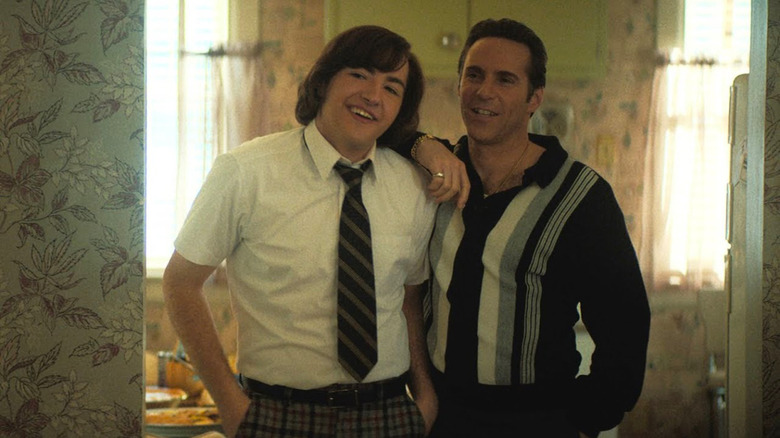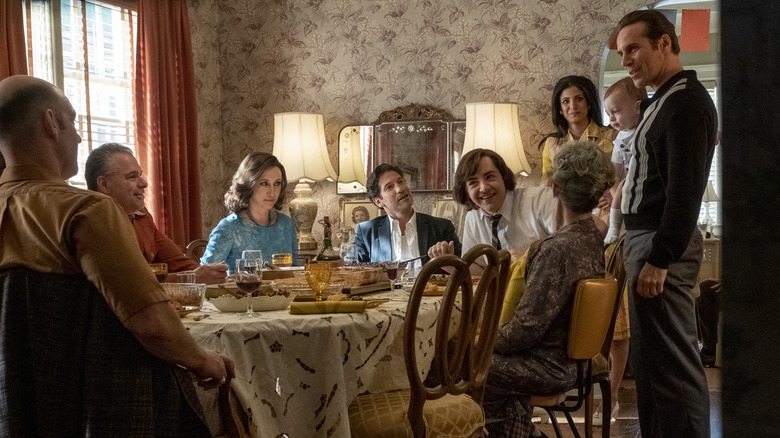The Many Saints Of Newark Review: The Sopranos Prequel Is A Bloody Deconstruction Of The Mob Movie
Entertainment focused on the mafia has often been accused of glorifying that lifestyle, sometimes erroneously. When "The Sopranos" arrived on HBO in 1999, it served as a deconstruction of practically every popular mob story, showing wiseguys who weren't master criminals in cool clothes but instead low IQ slobs in tracksuits who sat around all day talking about things they didn't really understand. These were not the slick gangsters of the movies; they were idiots and creeps who just happened to command a lot of power because they all shared a distinct lack of anything even approaching empathy.
Now, nearly 15 years after the show ended and changed the face of TV as we knew it, we're invited to return to that deconstructed world with "The Many Saints of Newark." If "The Sopranos" was a post-modern take on the goodfellas of the 21st century, "The Many Saints of Newark" strives to take this approach even further, going back to "the good old days" of the late 1960s and early 1970s. The gangsters here are a bit cooler — they're wearing well-tailored suits and cufflinks, unlike their dressed-down 21st-century counterparts. But they're just as dumb, just as brutal, just as heartless. There's nothing glamorous about this world. It's a cold, cruel, godless universe where funerals are abundant and no one has anything close to hope.
When it's focusing on the brutality and ugliness of its world, "The Many Saints of Newark" is something remarkable; a mob movie that still has all the familiar trappings of heavy food, tough guy accents, and Frank Sinatra songs. But there's a layer of grime coating everything; a sense that this is, in the end, a very small, nasty world full of low-lives who think they're hotshots. They may strike fear into their neighborhoods, but you get the sense that if these guys traveled a few blocks away from their houses absolutely no one would give a damn about who they were and what they were doing.
This is great stuff, but "The Many Saints of Newark" is also a "Sopranos" prequel, and the script, by "Sopranos" creator David Chase and Lawrence Konner, often gets way too cute with its winking references to the show. It's as if someone, somewhere, suggested that this film follow the lead of modern popular blockbuster entertainment and overload itself with easter eggs. Lines of dialogue we first heard in the show resurface. And some moments that were only discussed during the series run get fully brought to life here. It's not bad, exactly, and fans of the show might get a kick out of it all. But it's an approach that can often be distracting. Thankfully, it's not enough to sink the film.
"The Many Saints of Newark" opens with an unexpectedly creepy framing device that takes us through a graveyard. As the camera passes headstones we hear the ghostly voices of those buried beneath all that earth, fully aware that they're now deceased. The camera eventually settles on the grave of Christopher Moltisanti, a "Sopranos" character played by Michael Imperioli. Christopher is long dead, but that doesn't stop him from being our (occasional) narrator here, filling us in on the story of his father, the legendary wiseguy Dickie Moltisanti (Alessandro Nivola). Christopher will also tell us about the man who killed him, Tony Soprano. But this isn't Tony's story, not really — although he is always on the periphery, picking up the various traumas that will turn him into the man we met on that HBO show in 1999.
Starting in 1967 and then jumping forward to 1971, "The Many Saints of Newark" introduces us to various underworld characters in the Newark area. Some of them we know from "The Sopranos," like the dimwitted Paulie "Walnuts" Gualtieri (played here by Billy Magnussen) and the toupee-sporting Silvio Dante (John Magaro, doing a fairly good impression of Steven Van Zandt). And then there are new characters, like Harold McBrayer (Leslie Odom Jr.), a Black man who starts off as a low-level hood working for Dickie Moltisanti, but who later dreams of becoming a big-time player himself. His solution is to start making moves in mafia-run neighborhoods, and he's far more successful than you might expect.
In the End, He'll Never Get Away
As for Dickie himself, he's a man at war with his own soul, his own corrupt nature. He wants to believe he's a good guy — he coaches little league for blind kids; he takes an interest in raising his nephew Tony when Tony's father Johnny (Jon Bernthal) goes off to jail; he's free and loose with handing out $100 bills from the huge wad of cash he keeps in his pocket. But he's also a monstrous figure with a bloody temper. There are multiple occasions throughout the film where Dickie violently, and fatally, lashes out at people he's close to. Nivola does great work handling the character's unstable nature, playing Dickie not as a nutjob who can fly off the handle like Joe Pesci in "GoodFellas," but more like a man who wants to pretend he's calm and collected when he's anything but.
This is the inherent nature of many of the characters here. These are violent men who do terrible things, and then try to justify the terrible things they've done. In their minds, they're not bad guys — they're just misunderstood. And they're often living double lives. Dickie is married, but he's also in the middle of an affair with his much, much younger stepmother (Michela De Rossi), an immigrant fresh off the boat from Italy. He also pays secret visits to his incarcerated uncle (Ray Liotta), another act he considers a good deed that washes away his sins. The conversations between Dickie and his uncle recall the conversations between Tony and Dr. Melfi on "The Sopranos" — they're therapy sessions, where Dickie gets potentially helpful advice that he then ignores. He can't escape the violent existence he's ingrained himself into.
Bursts of that violence come frequently here, often with both shocking and ghastly results. Power tools are taken to mouths, heads rupture due to shotgun blasts, lives are snuffed out in the blink of an eye. And then there are more insidious moments. There's a truly brilliant sequence staged by director Alan Taylor that starts off loving and charming, with two characters (I'm being vague to avoid spoilers) having a sexual tryst in a public bathroom while Van Morrison's "Astral Weeks" plays romantically over the soundtrack. It's sweet and light, and even a little sexy. But one wrong word from one of the two lovers triggers a burst of cold, bleak violence that saps away any good vibes the previous moments might have created.
As for the young Tony Soprano, he's played here by Michael Gandolfini, son of the late James Gandolfini, who originated the role on "The Sopranos," and turned the part into one of the greatest TV characters of all time. Those are huge shoes to fill, and it must not have been easy for the younger Gandolfini to channel his late father. The results are often eerie — Gandolfini looks a heck of a lot like his dad, and he nails the older Gandolfini's mannerisms and diction to the point where there are times when it genuinely feels like we're just looking at a younger James Gandolfini up on the screen.
The Tony here isn't the full-blown monster we saw on "The Sopranos," but we can see he's already headed down that path. Tests from school indicate he's a bright kid, but he doesn't apply himself at all and would rather pull off petty crimes — like when he and his friends steal a Mister Softee ice cream truck. ("We all do stuff like that when we're kids," Tony's father helpfully offers. "Beat up the Mister Softee man.")
It doesn't help that Tony's mother Livia (Vera Farmiga, sporting a fake nose that miraculously doesn't take away from her bleakly funny performance) is an abusive narcissist who is prone to causing a scene wherever she goes. But "The Many Saints of Newark" is smart enough to point out that Livia isn't an anomaly in this world — she's just another borderline-sociopath who has found her place among murderous men. The ultimate tragedy is that we can see the tiniest glimmer of hope for Tony here, but we know it's a false hope. In the end, he'll never get away from this violent world. And he'll send those he claims to love straight to hell.
/Film Rating: 7.5 out of 10

